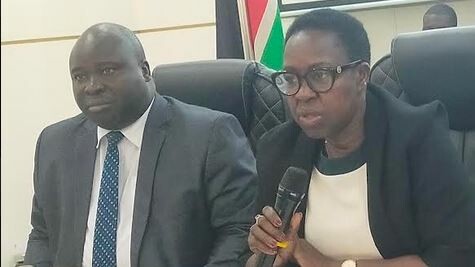The Speaker of the Transitional National Legislative Assembly (TNLA), Jemma Nunu Kumba, has attributed the problems of the weak judiciary in South Sudan to the inheritance of a bad judicial system from Sudan.
Speaking during a consultative meeting on judicial reforms with the Judicial Reform Committee (JRC), the Speaker also said South Sudan has not had enough time to reform the judiciary as it has been experiencing repeated transitional administrations.
“We inherited a system from the previous regime in Khartoum which was already inundated by a lot of problems and challenges and it is high time now that as an independent country, we look at our judicial system and make reforms that will make our institutions effective,” she stated. “We are talking about what can be done to make our judicial system effective and there are key areas or priorities that we need to look at as we do these consultations.”
“One is the issue of independence and impartiality of the judiciary and this requires that the judiciary should be free, without any interference from any other branch of government so that we can uphold the rule of law,” Kumba added.
She also emphasized that the citizens of the country are required to have access to justice.
“Every citizen should have access to the judiciary system regardless of their status, especially the women who sometimes do not have the resources to seek legal support. This requires that the government should put in place legal aid for certain vulnerable groups who cannot afford legal fees,” Kumba underscored. “We are also looking at having a transparent and efficient judiciary system. This can help to ensure that cases are addressed and there is no backlog of cases because justice delayed is justice denied.”
She said the capacity of the judiciary has to be built by putting in place programs to periodically train judges, court personnel, and legal professionals to maintain competence.
“Some anticorruption measures also need to be put in place to address corruption and maintain the integrity of the judiciary system,” the speaker added. “This will build trust among the citizens. Another issue is to ensure that legal processes are reviewed and updated to be in line with current practices in the region and other places. This will help address the deficiencies and adapt to evolving societal needs.”
She said building trust and confidence in the judicial system is crucial.
Asked why the country has taken so long to institute judicial reforms, Kumba said South Sudan has never had enough time.
“South Sudan has never had enough time to look at our system because since we signed the Comprehensive Peace Agreement (CPA) in 2005, everybody was busy with its implementation and preparing for the referendum,” she said. “It was not an easy transitional period to manage the CPA with our brothers in Khartoum so it was a very hectic time for all of us and then there were elections in 2010 and then the referendum in 2011. After 2011, we were trying to sit and start working on our institutions and reviewing what we inherited. Unfortunately, after only two years, we went into war in 2013.”
“Fortunately, the 2018 peace agreement stipulated that there be judicial reforms among other reforms,” Kumba added.
Meanwhile, James Ogola, a retired judge from Uganda who is the chairperson of the Judicial Reform Committee, said the work of the committee is to look at the judiciary and fix what is not working.
“Our work is to look at the judiciary which exists here and has existed for so many years through the wars, turmoil, and conflicts and see if there are things that are not working and if there are, to fix them,” he stated. “To do that, we use our professional understanding of judicial issues, but also, we have decided to engage and involve the people of South Sudan in this effort. When we are done, some of us, the chair and deputy, will go back to our countries but the reforms will be here the people of South Sudan will now be the ones to work with a brand new judiciary.”
“Therefore we formed the decision that we need to engage the people of South Sudan in this effort, it is their judiciary and they should have a voice in how it is reformed, and run and how it affects their lives when they have disputes,” Ogola added.
He revealed that the committee has so far interfaced with a wide spectrum of people from diverse and professional fields.




